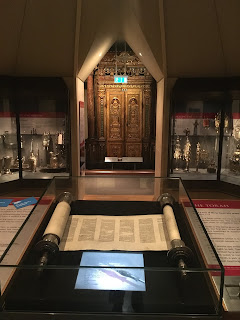 |
| Ark from Northern Italy from the 17th or 18th century, at the Jewish Museum in London |
If you’ve never been to synagogue on a Saturday morning, this is what happens:
The doors of the ark (like a cupboard) are opened and the Torah is taken out. Then we read from
the Torah. Every week, we read a little
more of the story. This week it was
about God promising Abraham to make his descendants as numerous as the stars of
heaven. Then we lift the Torah up in
the air for all to see. After we read, the people at synagogue look at the Torah and sing: ‘this is the Torah that Moses gave to the people of Israel’. The Torah is then paraded around the
community. Some people kiss the Torah as it goes by. And then the high point of the morning…just
before the Torah is returned to the ark, we sing ‘it is a tree of life for
those that grasp it…its ways are ways of pleasantness and all its paths are
peace’. Then the Torah is put back in the ark.
All over the world, for thousands of years, this drama has been
played out. The doors open, the Torah is
taken out. The Torah is read and put
back and then the doors are closed again.
Like revolving doors, week after week, in communities everywhere, people
expect that there will be a Torah inside the ark.
But it’s a magic trick really. Behind the scenes, there’s a world of
managers and scenery-shifters that ensure that every time the doors open the Torah will be there. In truth, the Torah doesn’t stay in the ark between
services.
My sister, Lisa, is one of the people involved in ensuring
this drama plays out correctly. After the
service, she takes the Torah out of the ark and carries it to a double walled,
steel safe where it is locked away, protected from vandals, thieves and
fire. Before the next Shabbat, it is
taken out of the safe and put back in the ark.
She said yesterday she saw a little boy had missed his
chance to kiss the Torah as it went by in the procession, so she let him kiss
it before she locked it away in the steel safe.
She said his eyes lit up, with the magic of the moment.
Next week in thousands of services, in thousands of synagogues
around the world, we will once again open the doors of the ark, take out the Torah, read from it, parade it
around, kiss it, then sing ‘it is a tree of life for those that grasp it’. No doubt we will cry. Then we
will put the Torah back in the ark. Behind
the scenes, it will be taken out and put in a safe place again.
Tonight in Pittsburgh there is a Torah scroll waiting in an ark
in a dark and bloody synagogue. It wasn’t read this week, but next Shabbat; it
will be taken out and read. It will be
kissed and paraded and put back in the ark.
And the story will go on
 |
| Torah scroll and ark at the Jewish Museum in London |










